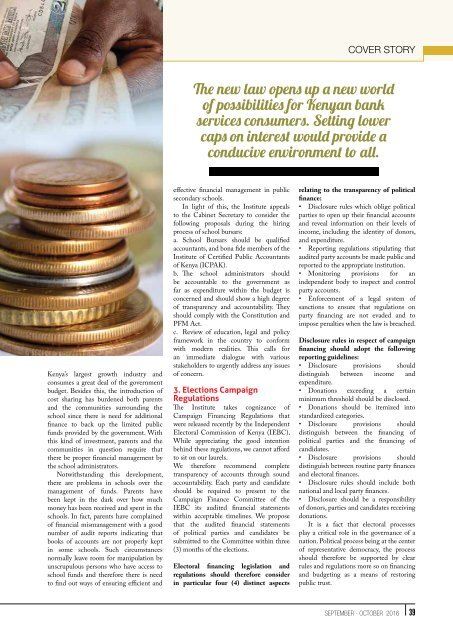The Accountant Sep-Oct-2016
You also want an ePaper? Increase the reach of your titles
YUMPU automatically turns print PDFs into web optimized ePapers that Google loves.
COVER STORY<br />
<strong>The</strong> new law opens up a new world<br />
of possibilities for Kenyan bank<br />
services consumers. Setting lower<br />
caps on interest would provide a<br />
conducive environment to all.<br />
Kenya’s largest growth industry and<br />
consumes a great deal of the government<br />
budget. Besides this, the introduction of<br />
cost sharing has burdened both parents<br />
and the communities surrounding the<br />
school since there is need for additional<br />
finance to back up the limited public<br />
funds provided by the government. With<br />
this kind of investment, parents and the<br />
communities in question require that<br />
there be proper financial management by<br />
the school administrators.<br />
Notwithstanding this development,<br />
there are problems in schools over the<br />
management of funds. Parents have<br />
been kept in the dark over how much<br />
money has been received and spent in the<br />
schools. In fact, parents have complained<br />
of financial mismanagement with a good<br />
number of audit reports indicating that<br />
books of accounts are not properly kept<br />
in some schools. Such circumstances<br />
normally leave room for manipulation by<br />
unscrupulous persons who have access to<br />
school funds and therefore there is need<br />
to find out ways of ensuring efficient and<br />
effective financial management in public<br />
secondary schools.<br />
In light of this, the Institute appeals<br />
to the Cabinet Secretary to consider the<br />
following proposals during the hiring<br />
process of school bursars:<br />
a. School Bursars should be qualified<br />
accountants, and bona fide members of the<br />
Institute of Certified Public <strong>Accountant</strong>s<br />
of Kenya (ICPAK).<br />
b. <strong>The</strong> school administrators should<br />
be accountable to the government as<br />
far as expenditure within the budget is<br />
concerned and should show a high degree<br />
of transparency and accountability. <strong>The</strong>y<br />
should comply with the Constitution and<br />
PFM Act.<br />
c. Review of education, legal and policy<br />
framework in the country to conform<br />
with modern realities. This calls for<br />
an immediate dialogue with various<br />
stakeholders to urgently address any issues<br />
of concern.<br />
3. Elections Campaign<br />
Regulations<br />
<strong>The</strong> Institute takes cognizance of<br />
Campaign Financing Regulations that<br />
were released recently by the Independent<br />
Electoral Commission of Kenya (IEBC).<br />
While appreciating the good intention<br />
behind these regulations, we cannot afford<br />
to sit on our laurels.<br />
We therefore recommend complete<br />
transparency of accounts through sound<br />
accountability. Each party and candidate<br />
should be required to present to the<br />
Campaign Finance Committee of the<br />
IEBC its audited financial statements<br />
within acceptable timelines. We propose<br />
that the audited financial statements<br />
of political parties and candidates be<br />
submitted to the Committee within three<br />
(3) months of the elections.<br />
Electoral financing legislation and<br />
regulations should therefore consider<br />
in particular four (4) distinct aspects<br />
relating to the transparency of political<br />
finance:<br />
• Disclosure rules which oblige political<br />
parties to open up their financial accounts<br />
and reveal information on their levels of<br />
income, including the identity of donors,<br />
and expenditure.<br />
• Reporting regulations stipulating that<br />
audited party accounts be made public and<br />
reported to the appropriate institution.<br />
• Monitoring provisions for an<br />
independent body to inspect and control<br />
party accounts.<br />
• Enforcement of a legal system of<br />
sanctions to ensure that regulations on<br />
party financing are not evaded and to<br />
impose penalties when the law is breached.<br />
Disclosure rules in respect of campaign<br />
financing should adopt the following<br />
reporting guidelines:<br />
• Disclosure provisions should<br />
distinguish between income and<br />
expenditure.<br />
• Donations exceeding a certain<br />
minimum threshold should be disclosed.<br />
• Donations should be itemized into<br />
standardized categories.<br />
• Disclosure provisions should<br />
distinguish between the financing of<br />
political parties and the financing of<br />
candidates.<br />
• Disclosure provisions should<br />
distinguish between routine party finances<br />
and electoral finances.<br />
• Disclosure rules should include both<br />
national and local party finances.<br />
• Disclosure should be a responsibility<br />
of donors, parties and candidates receiving<br />
donations.<br />
It is a fact that electoral processes<br />
play a critical role in the governance of a<br />
nation. Political process being at the center<br />
of representative democracy, the process<br />
should therefore be supported by clear<br />
rules and regulations more so on financing<br />
and budgeting as a means of restoring<br />
public trust.<br />
SEPTEMBER - OCTOBER <strong>2016</strong> 39

















